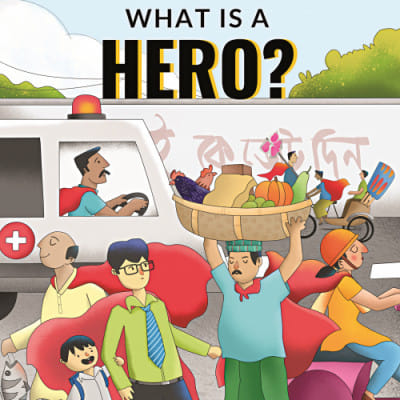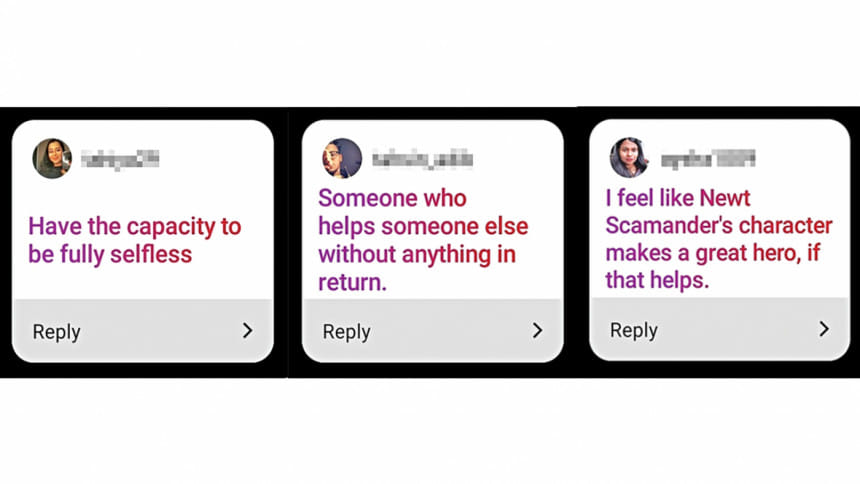WHAT IS A HERO?

In the current world where so many things seem to be going wrong, the idea of a hero can be comforting. The idea that a perfect, or even near perfect, entity exists to restore our moral worldview gives us hope. However, this still does not answer the questions we are looking to answer: What is a hero?
So, in order to see if we can unravel the concept a little more, layer by layer, we took the liberty of asking people what exactly a hero meant to them.
THE PROCEDURE
We proceeded to conduct a brief, informal survey in three different methods. The first was through using the question sticker on our personal Instagram stories. Here, we asked the question verbatim, "What/Who do you think makes a hero?", and the responses stored.
For the next method, we passed around blank papers in classrooms (SAT/GED/IELTS) at an institution and had them write down answers to the same question. Lastly, we asked the people around us – friends, colleagues, and family members –the question and recorded their responses.
We found out that these people, coming from varied backgrounds, and having different mentalities had oddly similar responses. Discussed below are the most common answers and the moral implications of each to help us better comprehend the matter.

THE RESPONSE
A sentiment
One of the most common responses we received was of a hero being someone who acts selflessly and righteously for the greater good.
"A hero is someone who overcomes their own fears and doubts and does something good," said Afsara Khan, 21, as one of the responses for the question. This tells us how closely we relate the idea of a hero to certain sentiments and qualities. It is an individual who is selfless and brave and knows just what to do in the most challenging of situations.
The concept of "moral particularism" states that there are no moral principles and that all moral judgement is determined by relevant factors according to the context. So an all-good hero would know the right thing to do during a trying situation, and their act would be considered morally correct because of their clear intentions to make the right choice. They would be someone who understands that in certain situations, you need to focus on what needs to be done, instead of dwelling on the consequences that would follow.
A fictional character
Straight out of books and movies, the hero is one character that steals our hearts. Fictional or real, they seem perfect in every shape and form, and we find comfort even in their flaws. But it is not this completely generic build of the perfect person; there is something about them that calls out to us. They are individuals we aspire to be or someone we wish we had in our lives. We secretly start to compare ourselves with them. We start to pick up their habits, and emulating their mannerisms and morals.
"My hero is someone who puts himself aside to aid anyone," said Faiaz Ahmed Kabir, 17.
One of the common traits of these characters that we tend to worship is their selflessness. They put other people before themselves. It is a principle that these characters live by, known as "virtue ethics" which is the theory that concerns sacrifice of self-interest, in service to a greater good. And the biggest example of such characters are superheroes, among many other fictional characters that we idolise.

A close one
We all have that one person around us whose existence we are eternally grateful for. Be it our parents, friends or significant others, there is someone that we truly appreciate and admire for all they do for us, and for who they are as people. We tend to put them on a pedestal, and believe them to be closest to perfection, and so we begin comparing them to our mental images of heroes.
Sometimes, we even alter our personal definition of heroes to match these people, because we have always seen them do the right thing. They know which option to choose. These people, like heroes, know exactly what is right, and go on to fulfil their duties, moral or otherwise.
This is where the idea of "deontology" comes in. According to the theory, the morality of an action should be determined by the degree of correctness involved in the action, rather than the consequences it may bring about. That, to act in the right way, one must first act from duty. Or as Dhrubo Nil Ghosh, 19, sent as a response, "(A hero is) a person who can step back and let things unfold, despite knowing the harrowing consequences."
Simply put, it is the idea that action is more important than consequences. Besides, that is what we really see anyways, the good things these people we call heroes keep doing without any anticipation of personal cost or benefit.

A saviour
We are all secretly waiting for somebody to swoop in and "save" us from all the things going wrong in our lives. We keep expecting that life will be better the minute that this person walks into our lives. However, this knight in shining armour is slightly more complicated than that. It is not easy to find someone like this in our lives.
The "saviour" is not really a specific person per se, but more of an idea that we have conjured up in our minds. It is a calculated, immaculate figment of our imaginations; a blueprint for the person that we expect someday. We expect them to appear magically and use the wands to erase all our sorrows away.
This person in our heads tends to fall under the theory of utilitarianism. The theory suggests that the purpose of this morality is to make life better by increasing the amount of good things in the world and decreasing the amount of bad things. Which, concisely, is exactly what the saviour does for us. We want this person to make the bad things go away, making our lives better somehow.
"A hero is someone who fixes all my problems," said Nibrash Kazi Subah, 22, when he was asked what a hero meant to him. Quite a ridiculous and unrealistic belief, is it not? How could one person be the solution to all the problems in our lives? However, we are only human. And at times, this blind faith is all that gets us through times that otherwise would seem impossible to survive. So I say, why not?

THE VERDICT
These concepts, when looked at as theories, seem vague and far from reality. In reality though, they are closer than we think.
Every time you have helped a friend when they were down, you have been a hero according to deontology. Every time you offered food to a stray puppy or kitten, you have increased the "good" in the world, and been a hero according to utilitarianism. Every time you lied to your parents about the broken vase to protect your little sister from being scolded, you have been a hero according to moral particularism. Every time you sat for an exam honestly even with bad preparation, you have been a hero according to virtue ethics. The hero we look for is not an ambiguous concept, neither is it a figment of our imagination. It is a part of us — there is a hero in everyone – waiting to be revealed.





Comments